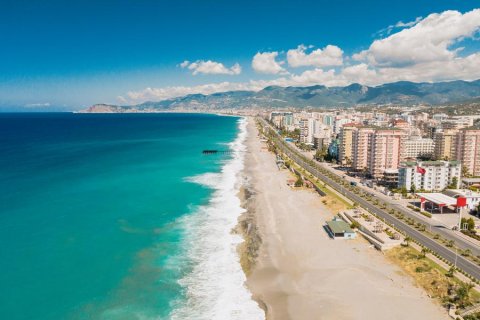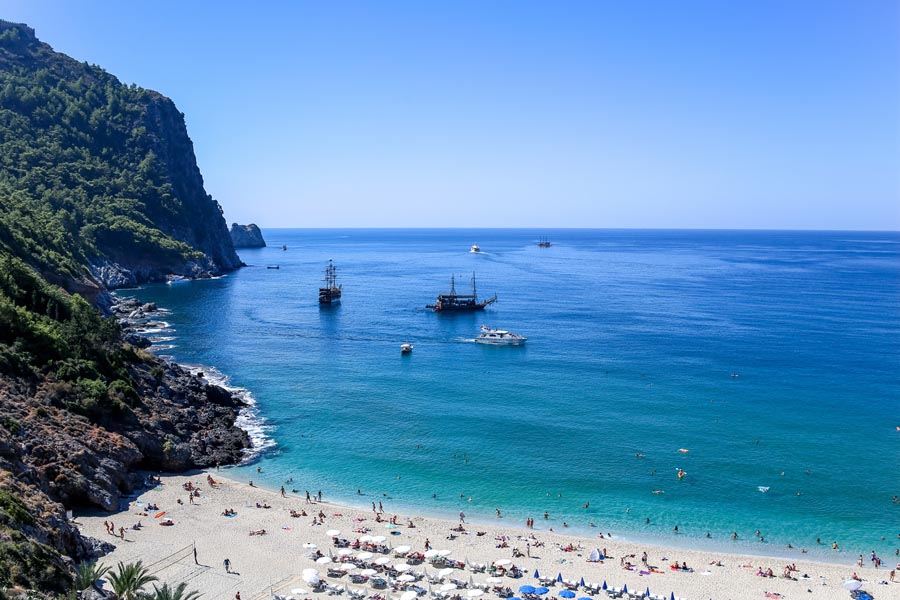
Are there distressed construction projects in Turkey? How does the Turkish climate affect building codes and standards? Why are panel and brick buildings prohibited in many Turkey’s provinces? What does a standard apartment look like in Turkey? Check out our article to find the answers to these and many other important questions.
Climate features
Spacious rooms with cool ceramic or marble floors, huge balconies, no floor and wall insulation nor central heating are norms and standards for the construction of residential real estate in Turkey which are primarily determined by the climate. Thanks to the year-round mild weather, houses in many provinces of Turkey do not need insulation and usually have huge balconies and terraces, panoramic windows to ensure maximum open space for free air circulation.
No severe winters is a plus that increases the attractiveness of investing in apartments in Turkey. However, there is also a downside (it, however, does not apply to resort regions, which are most popular with foreigners).

Earthquakes
Most of the country is a zone of seismic activity: Turkey is located at the junction of the plates of the lithosphere with the length of tectonic faults of 2,900 km. Therefore, more than 45 percent of Turkish housing is insured against earthquakes. Turkish developers strictly adhere to the regulations concerning the seismic resistance of buildings. Residential buildings in Turkey are built on solid, vibration-resistant reinforced concrete frames. In many regions of the country, the construction of panel and brick houses is prohibited.
In addition, a social building renovation program has been in place in Turkey since 2012, which is aimed at improving the resilience of housing to earthquakes. In 2020, renovation and improvement works in apartment buildings are being carried out in all districts of Istanbul. Over the years of this program, more than 1.3 million housing units have been improved in 257 seismic risk zones in Turkey.
Quality standards

Foreign buyers of apartments in Turkey have consistently noted the high quality of new housing. High competition and strict regulations make construction companies always improve the quality of construction. In 2015 (in response to complaints from property buyers in Turkey), a working group was created to work out a list of new standards for housing quality. The group was led by Hulusi Şentürk, the head of the Turkish Standards Institute (TSE): “Our task was to divide the housing into classes in terms of construction materials and to characterize Class A and Class B housing. So that, for example, a contractor who claims to have used first-class tiles can document their words by presenting a certificate of conformity. In addition, we had to decide on a standard for determining the net gross in construction so that contractors could not arbitrarily interpret these standards by adding a garden area, stairs, elevator shaft, parking lot, etc. to the apartment area."
Today in Turkey, millions of square meters of housing are commissioned annually. The latest housing standards and technical regulations, include the following:
- the construction and operation of apartments with an area less than 28.5 m2 is prohibited. The living room of a standard newly built apartment in Turkey must be at least 12 m2, the bedroom should be at least 9 m2, and the total area of housing must exceed 28.5 m2;
- it is prohibited to build studio apartments (in which the kitchen, bedroom and living room are used as one room). The minimum standard layout of new housing in Turkey (1+1) must necessarily include a bedroom, a living room (it can be combined with a kitchen) and a bathroom.
- in the southern provinces of Turkey, it is allowed to build housing made of wood and monolithic reinforced concrete (with strict quality concrete mixes and castings), concrete panels and bricks are prohibited (bricks can be used for the construction of load-bearing walls or as a finishing material);
- in the coastal regions of Turkey, it is allowed to build housing on a foundation of lattice reinforced or solid concrete slabs. Such a foundation will remain stable on the clay-sandy soils of the coast;
- it is allowed to build multi-apartment or individual housing using a pile foundation. In this case, the walls from the inside are laid out from foam concrete blocks or hollow bricks and also sheathed with plasterboard, which is covered with water-based emulsion paints while from the outside they are covered with expanded polystyrene tiles (with a reinforcing mesh);
ready-made new apartments in Turkey are commissioned with fine finish: with plastic or (less often) wooden windows, with flooring (marble, ceramic tiles or laminate), entrance and interior doors, plumbing fixtures, kitchen sets, main and spot lighting, etc. Buying a new apartment in Turkey, you can immediately move into it.
Violations and long-term construction
What awaits contractors who violate technical regulations? If a new house does not meet the standards, it will not get a genel iskan - a technical passport of the completed construction, an official permission to use a building. This document is issued to the construction company after the state commission inspects the new building. An unscrupulous contractor will have to eliminate all violations to get an iskan - confirmation that the object was built in accordance with the authorities' requirements, does not contradict the city's architectural plan and is ready to move in. Without an iskan, it will be almost impossible to connect the house to central networks, residents will not be able to get a registration number for water and electricity meters, and the residential complex itself may even be demolished (if the violations are too obvious and cannot be fixed).
Are there distressed construction projects in Turkey? Is there any risk of buying an apartment under construction and then waiting for its completion for many years? According to the law, the construction period of an object cannot exceed three years. This rule applies both to apartment buildings and complexes consisting of individual villas. Contractors who do not meet the deadlines face serious fines and further problems with obtaining permits for new construction projects: therefore, there are practically no long-term constructions in Turkey. Moreover, the Turkish construction business in 2020 is a streamlined system that forces contractors to finish projects ahead of schedule.
How long does it take to build a house in Turkey? The construction of a multi-storey luxury complex with an extensive holiday infrastructure takes, on average, one and a half to two years. It takes 9-12 months to build an ordinary Turkish apartment building, a villa - about 10 months.
Is it worth investing in housing under construction in Turkey? Definitely worth it! Firstly, the cost of a finished apartment is 20-30 percent higher than the cost of an apartment purchased at a very early construction stage. And secondly, real estate in Turkey is guaranteed to rise in price: in the first half of 2020 alone, the growth rate reached 14.4 percent. At the end of 2019, Turkey topped the rating of the countries where real estate rises in price the fastest. If, on average, in 56 countries included in the rating, the annual growth rate of apartment prices was 4.4 percent, then Turkey’s figures in 2019 is a 15 percent rise in price. Furthermore, the consumer confidence index in the construction industry in Turkey is also growing.
